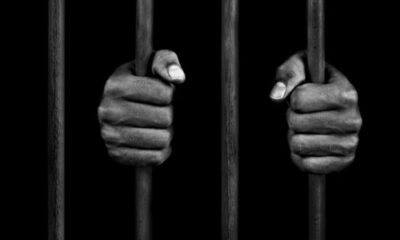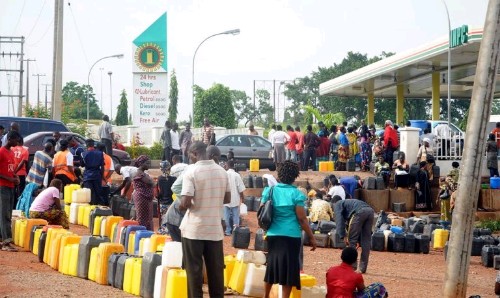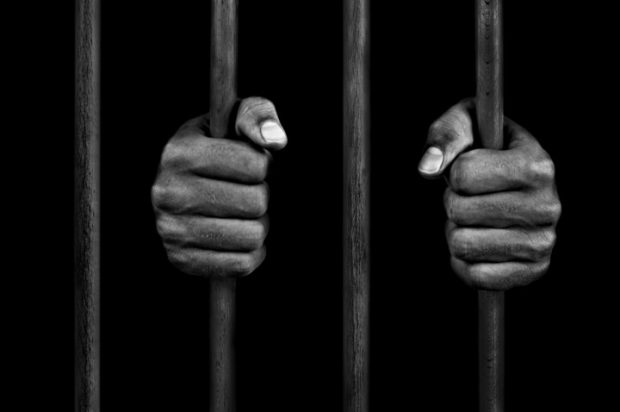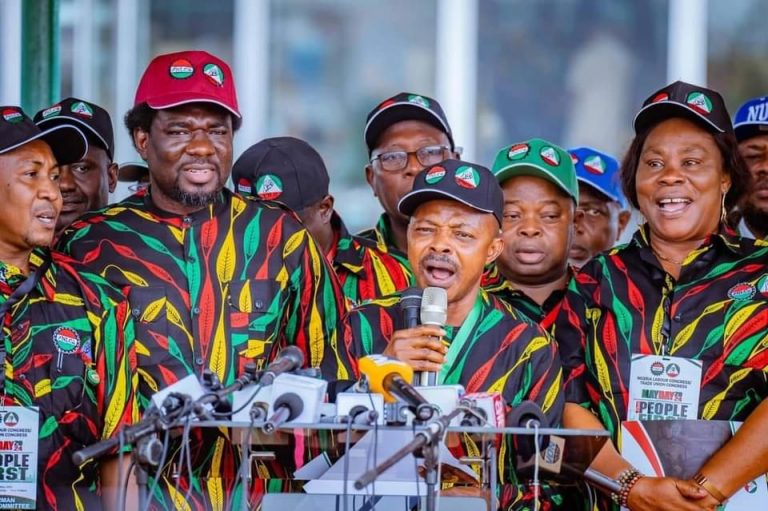The remaining states yet to implement the “N70,000” minimum wage for workers are making last-minute efforts to prevent the Nigeria Labour Congress from going on strike on Monday, December 1.
The states yet to approve the monthly wage are Katsina, Cross River, and Zamfara, after the Imo State Government authorized the implementation of the “N70,000” wage on Tuesday.
This means 33 states and the Federal Capital Territory have now complied with the 2024 National Minimum Wage Act.
Several states have agreed to pay above the “N70,000” starting point, with Lagos and Rivers offering the highest pay at “N85,000.”
Lagos also announced that its workers could expect up to “N100,000” monthly starting from the first quarter of 2025.
Workers in Akwa Ibom, Enugu, Oyo, and Niger will earn “N80,000,” while Delta and Ogun states approved “N77,000.”
Ebonyi, Osun, Benue and Kebbi states approved N75,000; Ondo, N73,000; Kogi and Kaduna, N72,000; Kano and Gombe, N71,000.
Abia, Adamawa, Anambra, Jigawa, Borno, Edo, Kwara, Nasarawa, Taraba, Ekiti, Bauchi, Yobe, Imo and Plateau states, as well as the Federal Capital Territory, all settled for N70,000.
But despite the NLC’s warnings, trio Katsina, Zamfara and Cross River have yet to implement the new wage, which could lead to a shutdown of activities in the affected states from Monday.
On Monday, labour unions in Cross River, who are demanding a new wage of N70,000 from the state government, directed state civil servants to embark on a two-day warning strike over the non-implementation of the new minimum wage.
The warning strike was signed by the Nigerian Labour Congress and the Trade Union Congress.
This followed a staged walkout from a scheduled meeting held on November 18 with state government officials, who formed members of the wage implementation committee at the office of the state’s Head of Service, Innocent Eteng, in Calabar, the state capital.
According to the labour leaders, last week, when the committee sat for the first time, the meeting ended in a stalemate when they perceived delayed tactics by the government to postpone the meeting to January.
The state’s civil servants said they were utterly disappointed when Governor Bassey Otu announced a new minimum wage of N40,000 on May 1, during the International Workers Day celebration at the U.J Essueine Stadium in Calabar.
Otu said that due to the state’s lean resources, caused by the statutory federal allocation aggravated by the unfavourable state Gross Domestic Product, the new minimum wage of N40,000 would be in line with realities rather than sentiments.
While giving instances of Edo, Lagos, Rivers and other governors, the workers said they were of high hope before the unexpected announcement of N40,000.
The strike action, which was signed by the Nigerian Labour Congress and the Trade Union Congress, was set to commence from November 24 midnight to 26, 2024.
The Cross River State Chairman, Nigeria Labour Congress, Gregory Ulayi, toild said that the union would embark on an indefinite strike if the state government failed to implement the new minimum wage for the workers.
He noted that the two-day warning strike was embarked upon by workers in the state between Monday and Tuesday, which he described as a call to action to the government.
Ulayi said that after the two-day warning strike, all workers were mandated to return to work as they waited to hear from the state government.
“If the government does not negotiate and do the needful, we will embark on a total strike because it is a directive across the country,” Ulayi said.
However, the Chief Press Secretary to Governor Otu, Nsa Gill, said that the state government had set up a committee to negotiate with the labour leaders, as part of last-ditch efforts to prevent the looming strike on Monday.
He said that despite the nationwide deadline for the implementation of the minimum wage, the Otu-led government was working to ensure payment of a minimum wage of N70,000 or even above.
“The state government has a negotiating team and they are at work. Though, they are yet to reach an agreement as at today (Thursday). The government is ready to pay the N70,000 new minimum wage, if not beyond,” he stated.
“We recognise the fact that there is a national deadline from the labour union, which is slated for December 1, 2024, for all the states to pay the new minimum wage.
“We are trying to see how to build a stronger economic foundation that can make us pay a living wage to our civil servants. Until the team finishes the negotiation, the amount will not be announced. Right now, they are still on the negotiation table for an amicable resolution.”
Katsina State is also likely to face labour’s wrath after its failure to implement the compulsory new wage bill for the state workers.
Multiple sources in the NLC secretariat in Katsina, the state capital, on Thursday, said that the state was yet to approve the payment.
Earlier report had it that the Katsina State Government inaugurated a 15-member committee to guide the implementation of a new minimum wage of N70,000.
Deputy Governor Faruk Lawal, while inaugurating the committee, said the government was aware of the hardship being faced by civil servants in the state.
“You are all aware that His Excellency, the Governor, Mallam Dikko Umar Radda, has set up a committee to implement the N70,000 minimum wage consequential adjustment to all categories of workers in the state.
“This includes the state civil servants, the Local Government employees and other categories of workers. The government is aware of the hardship being encountered by the civil servants,” he stated.
Led by Secretary to the State Government, Abdullahi Faskari, the committee was given three weeks to present strategies and recommendations, including the consequential adjustments for all categories of workers.
The committee includes prominent state officials such as the Head of Civil Service, Falalu Bawale; the state Commissioners for Finance, Budget and Economic Planning, and Local Government and Chieftaincy Affairs.
Others are the Special Adviser to the Governor on Labor Matters; as well as representatives from the Nigeria Labour Congress and the Trade Union Congress, among others.
However, the latest reports suggest the committee has not been able to approve the wage.
“Katsina State is yet to implement the new minimum wage though the state has set up a committee in that regard,” a top NLC official, who spoke on condition of anonymity said.
“Negotiation between the labour unions and the government committee members are still ongoing. Anything can happen between now and in four days to come (as at Thursday), which is the December 1 deadline.”
Meanwhile, the Zamfara state Government says it has concluded arrangements for the implementation of the new minimum wage adding that it had been talking with the labour leaders in the state.
Speaking (to The Punch), the Senior Special Assistant to Governor Dauda Lawal on Media and Communications, Mustafa Jafaru Kaura, said the state government would implement the new wage as soon as possible.
He said, “The state government has already set up a committee to work out modalities for the implementation of the new minimum wage of N70,000.”
He stated that the state government wanted to know the exact number of its civil servants and the amount involved before settling the new wage.
Kaura added, “The committee has gone far in its assignment and I am telling you that as soon as the committee finishes its assignment, Governor Lawal will surely implement the new wage.”
Kaura stated that members of the committee included labour leaders and other stakeholders who were given the responsibility to work out the modalities on how best to implement the new wage.
He stressed that the state government would never fail the civil servants, adding that “Governor Dauda Lawal is one of the civil servants’ friendly governors in the country.”
“Zamfara workers will never be left out in terms of the new minimum wage,” he added.
“I want you to remember that when he assumed office as the Governor of the state, he met the state’s civil servants collecting N18,000 as minimum wage.”
“He quickly directed the state’s ministry of finance to start implementing the N30,000 minimum wage which was done.’’
“So, I am assuring you that, the Governor will soon implement the new minimum wage for N70,000,” Kaura said.
Earlier in November, Governor Lawal reiterated his government’s resolve to pay the minimum wage after working out all necessary modalities.
He said, “We have to know what comes in, the number of our workforce, and what we will pay as minimum wage,” adding, “The welfare of my workforce has been my priority since I assumed office.”
“When we came on board, for four months workers of the state had not been paid their salaries, and the first thing I did was to pay the workers.
“Today, as from the 25th of every month, I make sure that workers are paid. So, in other words, I spend about N5bn on wages every month. I paid my workers. I improved the salaries of local government staff as well as paid pensioners.
“So every month, I boost the state’s economy. If you go around, you will see how small traders are making brisk business from the goods they display in markets and streets.”
Commenting on the backlog of pension arrears he inherited from previous administrations, he said that out of the N13bn pension liabilities, he was able to settle over N11bn.
Credit: The Punch

 BIG STORY4 days ago
BIG STORY4 days ago
 BIG STORY4 days ago
BIG STORY4 days ago
 BIG STORY4 days ago
BIG STORY4 days ago
 BIG STORY3 days ago
BIG STORY3 days ago
 BIG STORY3 days ago
BIG STORY3 days ago
 BIG STORY4 days ago
BIG STORY4 days ago
 BIG STORY1 day ago
BIG STORY1 day ago
 BIG STORY3 days ago
BIG STORY3 days ago






















